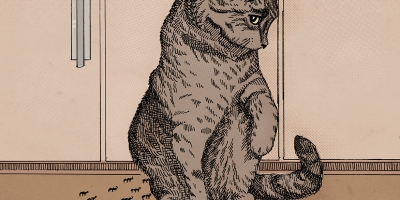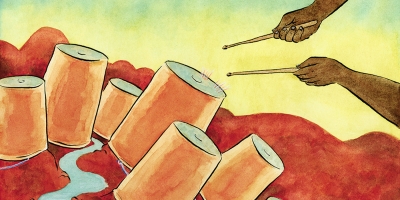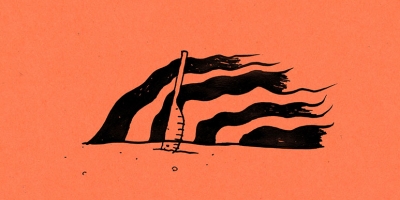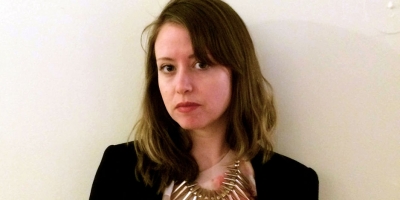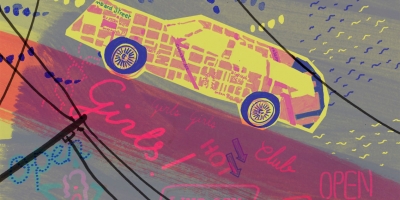Nonfiction
How to Parallel Park in San Francisco
by Helena Fitzgerald

I am a terrible driver. San Francisco is also an exceptionally difficult town in which to drive, but nevertheless, I am a terrible driver. Three months after this story takes place, I will move to New York City and from then on spend my life exclusively in cities with celebrated public transit systems, and never drive a car again. But right now I’m a terrible driver, and San Francisco is a particularly difficult place in which to be a terrible driver. I’m looking for parking, and I’m probably going to have to parallel park, and I am weighing the necessity of this activity against all future activities. Perhaps it might be better to spend the rest of my life driving an imperfect circle around North Beach’s hills than to try to parallel park my car.
I’ll never know if the Bay Area is in fact boring or if I was just an especially sheltered teenager. The condition of adolescence, at least in my experience, is that of standing outside an opaque structure, walking around it looking for the door, and never getting inside. I understand that it was not like this for everyone. But I’m a month from finishing high school, and since I can remember there has always seemed to be a party I’m missing because I’ve failed to understand how verbs work, failed to learn how one takes action rather than simply looks at things. I have grown up in an astoundingly beautiful place, but at age seventeen I have never wanted anyone and have never felt wanted. I am convinced the world’s beauty exists only in two dimensions, that things can only be looked at and not touched, as though until now I’ve only been standing in front of a very large painting, politely keeping to the museum’s rules. In the last few months, though, a lot of things have gone wrong (family things and money things, beginning to understand the brutally intertwined relationship of those two nouns, a small seam that splits the my life into the part before I came home and saw my dad crying, and everything after that). Now, as though sickeningly resultant of other losses, the physical world around me seems to have taken on weight and volume, ripeness and skin.
I’m in North Beach and it’s just before midnight and I still haven’t found parking. I reach the top of the hill at Green Street and drive back down, restarting the same circle. The city’s public transit system doesn’t stay open this late, nor does it really service this part of the city, but the neighborhood is alive in neon, in bedroom eyes and slurred consonants. Everyone is awake and everyone’s drinking and everyone is driving home. Or perhaps no one is drinking and driving. Maybe everyone is going home together. It’s midnight in summer in an old Italian neighborhood that’s turned into the strip clubs and bookstores and bar. You can almost see sex dripping off everyone, getting everywhere, sticking to windowpanes and the outside of cars, sealing the small café tables to the sidewalk, drawing strangers toward one another in a wet, invisible spiderweb. I have grown up in a city made out of sex and yet never had it myself. It turns midnight on the digital clock on the dashboard, and I can’t find parking. I drive back up the hill.
There’s easy street parking in front of the apartment building, but he says technically it’s his landlord’s parking space. His landlord never uses it, but just to be safe, he says. He says if I park there, it’ll probably be the one time the landlord shows up and wants to use the space. I agree with that understanding of the world, of how logic operates and what justice is, so I once again drive by his house and the space available there.
All cities in the end come down to one room. San Francisco is a wide arm of a beach stretching around a bay, the cool blue of a morning, the way the sun is always fierce ahead of you no matter how early you wake up, how the white tops of boats appear taller and taller as your car skis down wide-avenued hills, driving beside unused cable-car tracks, their phone-line architecture like a different era strung up in permanent Christmas lights all over the city’s map. It’s the impossibly long stretch between afternoon and evening, when the light is the color of sand and long flat roads near Baker Beach spread out in a grid as though generated by a computer into three dimensions all the way to the ocean. It’s closed-mouth neighborhoods in Marin, driveways overhung with trees that bend to sweep the ground, where you can drive and drive, daring yourself to see how far you can go while the road gets narrower, until you reach some unexpected mountain vista and you have to make a complicated backward turn to drive back the way you came.
But for me, in the end, it’s none of those things. San Francisco is a single room in the front of an apartment where bay windows overlook the steep slope of the second-to-last block of Green Street. It’s a room where a boy seven years older than I am hasn’t finished moving in yet—or so he claimed, and I believed him then. It’s a trail of spilled pocket change leading from the doorway to the twin-sized mattress on the floor, a stale glass of water next to the bed. It’s the city coming in through the huge windows when he turns the lights off, so the room is brighter than it was before. It’s staying out when it’s already too late, when I already should have left. There are moments in our lives like harbors, at which a universe of future moments strain, moored at a single choice, waiting to push off into consequence.
Of course, what happens in this story is sex. What happens is that I’ve never even been kissed before, and now I meet up with this much older boy who’s asked me to come over at midnight and have sex. But events themselves like that seem to miss the point. What seems far more real to me now is the moment before it happens, the moment when it still could not have, the inhale within the decision. Its consequences are only a done deal, a result, but there is a moment when I could have just stayed in that car forever and everything would have been rewritten. Ten years later, I’ll met him again through Facebook, once Facebook exists, and he’ll be married but ask me to have dinner anyway, and a few months later he’ll leave his wife, and a few months after that he’ll go back to her, and our lives will close up like skin over cuts, as though we’d never known each other at all. That doesn’t happen if I don’t stop the car. You can create a whole sculpture of consequence that rains down through a life, and you can stop it all by just giving up on trying to find parking and driving home.
I drive up one more time, two blocks past his apartment where the hill gets steeper, past where it feels like it could possibly continue. Just before the hill crests into a small observation area that offers a narrow walking path up to Coit Tower and a vista, there’s an empty parking space along the near-ninety-degree edge of the street. It wasn’t there before, on my last circle around this same perimeter, but there it is now. Someone must have left, some impulse taking them, some decision finally made, answering a text message that sent them off at midnight to another part of the city, or perhaps not the city at all but somewhere beyond the airport and south into farmland, green valleys broken by driftwood beaches out of nowhere, as the land refuses to reveal itself.
Wherever they’ve gone, there’s a parking spot now, and I’m not happy about it. After all this looking, I’m only disappointed when a parking spot appears. I can feel the disappointment clutching somewhere around my lungs and pulling downward, a gray, twitching thing. I am terrible at parallel parking. I pull next to the car in front of the space. Behind me I imagine another car, slick and clean and fast as a shark, coming in to take the spot through some impossibility of physics. I believe in it so much I look over my shoulder. This doesn’t happen. I angle the back of the car, trying to make a clean hypotenuse resolve into a line as though by a little shudder of magic. It’s more like a lurch. I re-angle it at the last minute, just barely keep from hitting the bumper of the car behind me. When I get out, the nose of my car is sticking out at an obvious angle, the car still diagonal, a too-wide space between it and the curb.
It’s not twelve-thirty yet, and I’m not quite old enough to not think that this is the middle of the night. Perhaps what I mean is I’m not young enough to not think that. I’m caught feeling both not young enough and not old enough, at once, and this feeling will persist for much longer than I have any idea it might or it could. I’m standing in the slight wind at the top of the steep hill just below Coit Tower, and beyond the San Francisco Bay spreads out in glittering, pristine lights, a thing fully aware of how impossible it is not to love. I should probably fix my car. I could get back in and stay in, pulling up and angling back and pulling up and angling back and not getting it right and trying it again for hours, until he stopped expecting me, until it became reasonably too late to do anything but not park at all and drive back to my parents’ house. I stand there, looking at the crooked silver car, the street like a ski slope, the view behind it like the world’s biggest landing strip.
We are taught not to delay things, to get them over with and move forward into what’s next and what’s next after that. The pages slip and the screens start coming too fast to focus on each one as I leave the car and walk two blocks down the hill. Even now, I can still get back to this exact moment, as though consequences were a form a of time travel. Two blocks down, I walk up a flight of steps to a buzzer, a low light, a yellow hallway. He answers the door, jovially, hugging me, laughing when it throws me off balance, and his face is like a dark room in a museum after it closes. I’m still back at my car, watching myself, watching the decision catch at a hook and swing before anything happens. I hold my breath, trying to stay forever suspended in the before.
